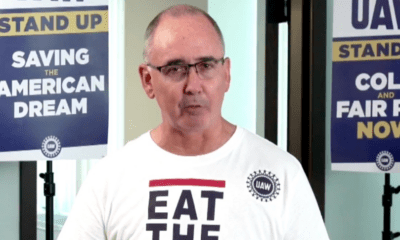ECONOMY
More Mortgage Applications Are Being Denied Due To Insufficient Income
Published
9 months agoon

idmortgagebroker
The number of mortgage applications rejected due to insufficient income shot up in 2022, amid high home prices and rising interest rates, according to a new report from the Consumer Financial Protection Bureau.
Overall, the denial rate for home purchase applications for all applicants was 9.1% in 2022, up from 8.3% in 2021 but slightly below 2020’s 9.3%, according to the CFPB.
In 2022, lenders denied loan applications due to insufficient income, as calculated by debt-to-income (DTI) ratios, more often than during any year since records began in 2018, the agency said.
DTI has become more likely to be reported as a denial reason for denied applications of all major racial/ethnic groups in 2022, the agency said.
By the end of 2022, over 50 percent of all Asian applicants and around 45 percent of all Black and Hispanic white applicants who were denied had DTI reported as a denial reason, the agency said.
One direct consequence of higher interest rates is the higher monthly payments borne by borrowers, the agency said.
The average monthly payment excluding taxes and insurance for borrowers taking out a conventional conforming 30-year fixed-rate mortgage skyrocketed in 2022, from $1,400 in December 2021 to $2,045 in December 2022, a 46.1% increase.
High prices and interest rates didn’t just fuel denials, they also slowed applications in general. The total number of mortgage applications in 2022 dropped by about 9 million, or 38.6% from 2021.
Mortgage applications have been steadily decreasing as rates have climbed to the highest level in nearly 23 years, according to the latest weekly survey from the Mortgage Bankers Association.
For the week ending Sept. 29, applications declined 6% from the week before, according to the MBA.
Rates for all mortgage products increased, with the 30-year fixed mortgage rate increasing for the fourth consecutive week to 7.53 percent – the highest rate since 2000,” Joel Kan, MBAs Vice President and Deputy Chief Economist, said in a statement.
As a result, mortgage applications grounded to a halt, dropping to the lowest level since 1996. The purchase market slowed to the lowest level of activity since 1995, as the rapid rise in rates pushed an increasing number of potential homebuyers out of the market, Kan said.
Real estate expert Joshua Cadillac said the increase in interest rates isn’t surprising.
The increase in interest rates was always going to cause this eventually, Cadillac said. The net result though tends to be more workers asking their bosses for raises. The recent labor disputes by several large labor unions is a reflection of the financial unrest that exists from workers not being able to afford what they used to.
Cadillac went on to highlight that the main reason for insufficient funds is due to the inflationary market we are living through.
Wages are going up but not enough to allow people to buy the same thing they could have bought a year ago. Effectively people are making more but seeing their standard of living fall.
TMX contributed to this article.
More From Local News X
-


GM Agrees To Put EV Battery Plants Under UAW Contract…
-


Drone light show visible over residential homes in Las Vegas,…
-


UAW Strike: Workers Picket In Toledo, Ohio (9/17/23)
-


TikToker Explains Ban As Congress Gets Closer To Passing Divestiture…
-


More: Bay Bridge lights officially off.
-


More: Nurses Continue Strike At Mount Sinai Hospital In Harlem
-


Prep For Macy’s Thanksgiving Day Parade Spotted On Wednesday Afternoon
-


More: People lined up to buy bottles of water in…
-


More – NY Climate Week: Protestors Rally Outside Bank of…
-


Coventry, UK: Amazon Warehouse Workers Strike Over Reported Pay Dispute…
-


Jane Fonda Joins Writers Guild Of America Picket In Solidarity…
-


Moore County, NC Power Outage: Sunrise Theater (Where Drag Show…
